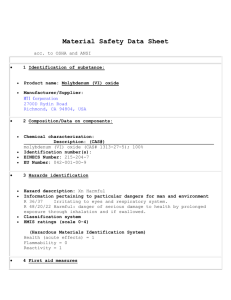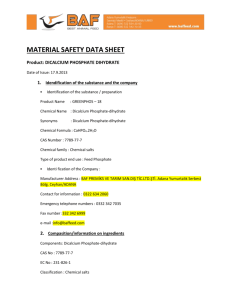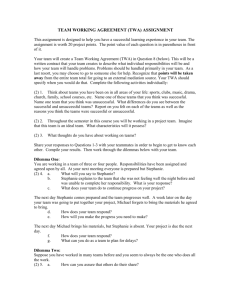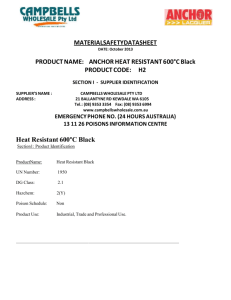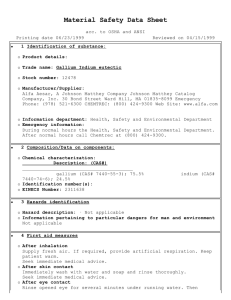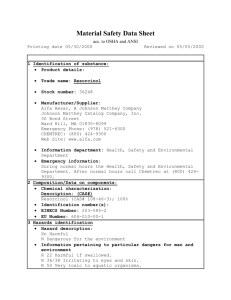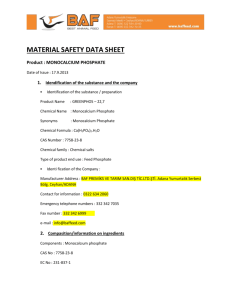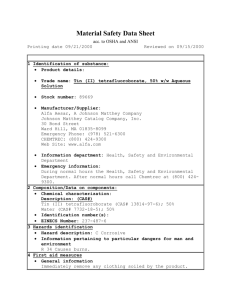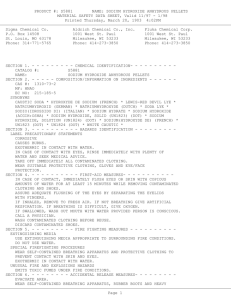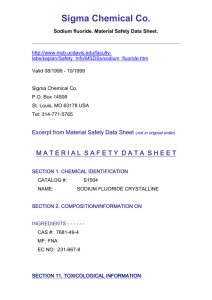ITO 2731TN
advertisement
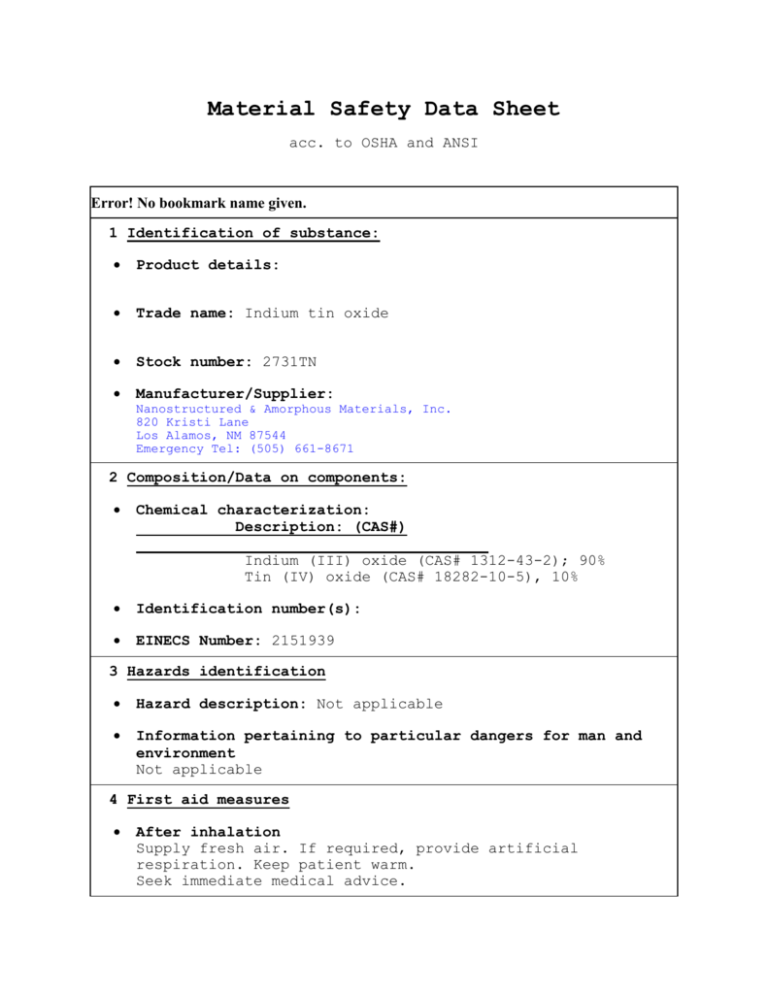
Material Safety Data Sheet acc. to OSHA and ANSI Error! No bookmark name given. 1 Identification of substance: Product details: Trade name: Indium tin oxide Stock number: 2731TN Manufacturer/Supplier: Nanostructured & Amorphous Materials, Inc. 820 Kristi Lane Los Alamos, NM 87544 Emergency Tel: (505) 661-8671 2 Composition/Data on components: Chemical characterization: Description: (CAS#) Indium (III) oxide (CAS# 1312-43-2); 90% Tin (IV) oxide (CAS# 18282-10-5), 10% Identification number(s): EINECS Number: 2151939 3 Hazards identification Hazard description: Not applicable Information pertaining to particular dangers for man and environment Not applicable 4 First aid measures After inhalation Supply fresh air. If required, provide artificial respiration. Keep patient warm. Seek immediate medical advice. After skin contact Immediately wash with water and soap and rinse thoroughly. Seek immediate medical advice. After eye contact Rinse opened eye for several minutes under running water. Then consult a doctor. After swallowing Seek medical treatment. 5 Fire fighting measures Suitable extinguishing agents Product is not flammable. Use fire fighting measures that suit the surrounding fire. Protective equipment: Wear self-contained respirator. Wear fully protective impervious suit. 6 Accidental release measures Person-related safety precautions: Wear protective equipment. Keep unprotected persons away. Ensure adequate ventilation Measures for environmental protection: Do not allow material to be released to the environment without proper governmental permits. Measures for cleaning/collecting: Pick up mechanically. Additional information: See Section 7 for information on safe handling See Section 8 for information on personal protection equipment. See Section 13 for disposal information. 7 Handling and storage Handling Information for safe handling: Keep container tightly sealed. Store in cool, dry place in tightly closed containers. No special precautions are necessary if used correctly. Information about protection against explosions and fires: No special measures required. Storage Requirements to be met by storerooms and receptacles: No special requirements. Information about storage in one common storage facility: Not required. Further information about storage conditions: Keep container tightly sealed. Store in cool, dry conditions in well sealed containers. 8 Exposure controls and personal protection Additional information about design of technical systems: Properly operating chemical fume hood designed for hazardous chemicals and having an average face velocity of at least 100 feet per minute. Components with limit values that require monitoring at the workplace: Indium and compounds ACGIH TLV Belgium TWA Switzerland TWA United Kingdom TWA Netherlands TWA Denmark TWA Finland TWA Ireland TWA mg/m3 0.1 as In 0.1 0.1 0.1 as In, 0.3 as In-STEL 0.1 0.1 0.1 0.1, 0.3 STEL Tin metal, tin oxide and inorganic tin compounds, except tin hydride, as Sn mg/m3 ACGIH TLV 2; 2-metal Belgium TWA 2 Denmark TWA 2 Finland TWA 2 Germany 2-inhalable fraction of the aerosol Hungary TWA 1; 2-STEL Ireland TWA 2; 4-STEL Netherlands TWA 2 Switzerland TWA 2; 4-STEL United Kingdom TWA USA PEL (respirable) 2-metal 2; 4-STEL 2-inorganic compounds except oxide; Additional information: No data Personal protective equipment General protective and hygienic measures The usual precautionary measures for handling chemicals should be followed. Keep away from foodstuffs, beverages and feed. Remove all soiled and contaminated clothing immediately. Wash hands before breaks and at the end of work. Breathing equipment: Use suitable respirator when high concentrations are present. Protection of hands: Impervious gloves Eye protection: Safety glasses Body protection: Protective work clothing. 9 Physical and chemical properties: Form: Powders Color: yellowish green Odor: Odorless Value/Range Unit Method Change in condition Melting point/Melting range: Not determined Boiling point/Boiling range: Not determined Sublimation temperature / start: Not determined Flash point: Not applicable Flammability (solid, gaseous) flammable. Product is not Ignition temperature: Not determined Decomposition temperature: Not determined Danger of explosion: Product does not present an explosion hazard. Explosion limits: Lower: Not determined Upper: Not determined Vapor pressure: Not determined Density: at 20 oC 7.14 - 7.17 g/cm3 Solubility in / Miscibility with Water: Insoluble 10 Stability and reactivity Thermal decomposition / conditions to be avoided: Decomposition will not occur if used and stored according to specifications. Materials to be avoided: Acids Dangerous reactions No dangerous reactions known Dangerous products of decomposition: No dangerous decomposition products known 11 Toxicological information Acute toxicity: Primary irritant effect: on the skin: Generally the product does not irritate the skin. on the eye: May cause irritation Sensitization: No sensitizing effects known. Subacute to chronic toxicity: Exposure to indium compounds may cause pain in the joints and bones, tooth decay, nervous and gastrointestinal disorders, heart pain and general debility. Experiments with animals also indicate that indium may cause reduced food and water consumption with weight loss, pulmonary edema, pneumonia, blood, liver and kidney damage, leg paralysis and damage to the brain, heart, adrenals and spleen. Metallic tin and inorganic tin compounds may cause nausea, vomiting, diarrhea, irritation and pneumoconiosis. Additional toxicological information: To the best of our knowledge the acute and chronic toxicity of this substance is not fully known. No classification data on carcinogenic properties of this material is available from the EPA, IARC, NTP, OSHA or ACGIH. 12 Ecological information: General notes: Do not allow material to be released to the environment without proper governmental permits. 13 Disposal considerations Product: Recommendation Consult state, local or national regulations for proper disposal. Uncleaned packagings: Recommendation: Disposal must be made according to official regulations. 14 Transport information Not a hazardous material for transportation. DOT regulations: Hazard class: Land transport ADR/RID None (cross-border) ADR/RID class: None Maritime transport IMDG: IMDG Class: None Air transport ICAO-TI and IATA-DGR: ICAO/IATA Class: None Transport/Additional information: Not dangerous according to the above specifications. 15 Regulations Product related hazard informations: Observe the general safety regulations when handling chemicals National regulations All components of this product are listed in the U.S. Environmental Protection Agency Toxic Substances Control Act Chemical Substance Inventory. Information about limitation of use: For use only by technically qualified individuals. 16 Other information: Employers should use this information only as a supplement to other information gathered by them, and should make independent judgement of suitability of this information to ensure proper use and protect the health and safety of employees. This information is furnished without warranty, and any use of the product not in conformance with this Material Safety Data Sheet, or in combination with any other product or process, is the responsibility of the user.
